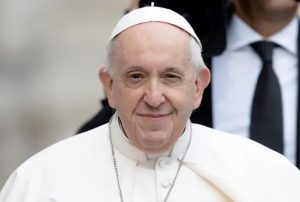The Pope condemns Europe’s treatment of migrants
The treatment of migrants arriving in Europe is “disgusting, sinful and criminal” according to Pope Francis.
The pope’s remarks, which were made during the canonisation of a bishop known as “the father of migrants” at the Vatican, came days after Italy elected a right-wing government that has vowed to curb migration.
“Indeed, the situation of migrants is criminal,” Pope Francis said.
“They are left to die in front of us, making the Mediterranean the largest cemetery in the world,” he said.
“The situation of migrants is disgusting, sinful and criminal. Not to open the doors to those who are in need. No, we exclude them, we send them away to lager, where they are exploited and sold as slaves.”
Pope Francis, who is the son of Italian migrants to Argentina, has frequently spoken about migration issues during his papacy.
 Most recently, he described how some migrants were killed while crossing the Mediterranean Sea or were returned to Libya and put in camps he likened to Nazi concentration camps.
Most recently, he described how some migrants were killed while crossing the Mediterranean Sea or were returned to Libya and put in camps he likened to Nazi concentration camps.
‘’Do we welcome them as brothers, or do we exploit them?” the pope said during the ceremony.
Giorgia Meloni, who appears poised to become Italy’s next prime minister, has called for a naval blockade to prevent boats of migrants from arriving from North Africa.
Ms Meloni’s centre-right coalition includes Lega, an anti-immigrant party that won nine per cent of the vote in the recent national elections.
Pope Francis’s comments came as he canonised Giovanni Battista Scalabrini, a 19th-century bishop known for his work supporting migrant rights.
Scalabrini, bishop of the northern Italian city of Piacenza from 1876 to 1905, lived at a time of mass migrations in Europe brought by economic, industrial and scientific changes that led millions to seek a new life in the Americas.
His advocacy for immigrants created the foundation for the church’s pastoral approach to migration today.
Born in Como, Italy, in 1839, Scalabrini was appointed bishop at age 36, as millions of Italians were fleeing their homeland for Brazil, Argentina and the United States, leaving behind their families, their culture and their faith. In 1887, he founded the Missionaries of St Charles Borromeo and later the Missionary Sisters of St Charles.
Migration was viewed negatively at the time, but Scalabrini took a different approach, seeing the upheaval as a chance to ease socioeconomic tensions at home while promoting cultural encounter and jump-starting progress.
But he warned that, without the proper laws and protections in place, migration could strip people of their roots and make them prey to human traffickers.
Unlike many of his contemporaries, Scalabrini believed migration is not only “a sacred human right” but a basic fact of human existence.
The pope also canonised a 20th-century man who ministered to the sick in Argentina in the ceremony.
The pope told the thousands of attendees gathered that the two individuals “remind us of the importance of walking together”.












